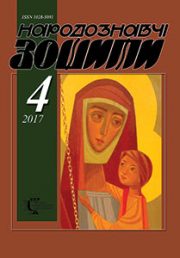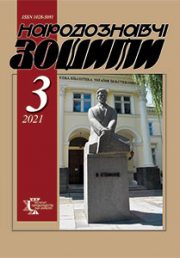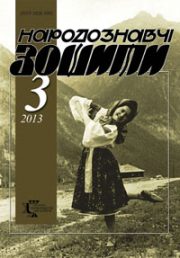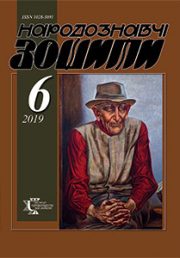The Ethnology Notebooks. 2024. № 1 (175), 83—95
UDK 94(477)”1991/1993”:061.2(=161.2:100)
DOI https://doi.org/10.15407/nz2024.01.083
YATSIV Andriy
- ORCID ID: https://orcid.org/0000-0003-1421-6518
- Master of History, Deputy Director,
- The International Institute of Education,
- Culture and Diaspora Relations,
- Lviv Polytechnic National University,
- 32A, Stepana Bandery Street, 79013, Lviv, Ukraine,
- Contacts: e-mail: yatsiv@gmail.com
Abstract. The article highlights the development of relations between the World Congress of Free Ukrainians (WCFU) and the Ukrainian state authorities, public institutions, and society in 1991—1993. Being a superstructure of Ukrainian communities in the diaspora, the WCFU began active communications with representatives of state authorities, public institutions, and society from the first months of the existence of an independent Ukrainian state, seeking ways of interaction and assistance. The systematic participation of the WCFU representation in significant events in Ukraine in the first years of independence and the search for ways to help the Ukrainian state and people demonstrated the clear intention of the Ukrainian diaspora at the beginning of the 1990s to overcome the artificial break between Ukrainians in Ukraine and abroad, caused by years of Soviet occupation, and to become a factor in the revival and development of Ukraine.
The purpose of the article is to systematize and analyze the chronology and development of relations between the World Congress of Free Ukrainians, its representatives and structural components on the one hand, and the Ukrainian state authorities, public institutions, and society on the other in 1991—1993.
The object of the study is the Western Ukrainian diaspora and the World Congress of Free Ukrainians. The subject of the study is the processes of communication and relations between the WCFU and the institutions of the Ukrainian state and society.
The practical significance of the study lies in the possibility of applying its conclusions to expand the theoretical base of Ukrainian diaspora studies, in particular the institutional movement of the Western Ukrainian diaspora and Ukrainian socio-political thought of the XX century.
Keywords: Ukrainian diaspora, World Congress of Free Ukrainians, state independence of Ukraine, Yuriy Shymko, Vasyl Veryga, Leonid Kravchuk.
Received 13.02.2024
REFERENCES
- Neduzhko, Y. (2006). The struggle of the Ukrainian diaspora in the USA for the revival of Ukraine’s state independence (end of the 50s —beginning of the 60s of the XX century). Mandrivets, 4, 55—61 [in Ukrainian].
- Neduzhko, Y. (2009). The Ukrainian diaspora in the process of restoring Ukraine’s state independence (mid 40s — early 90s of the XX century). Lutsk: Volyn Regional Printing House [in Ukrainian].
- Kononenko, A. (2016). World Congress of Ukrainians in the context of supporting Ukraine’s sovereignty and inviolability of its borders. Ukrainian Almanac, 19, 129—133 [in Ukrainian].
- Atamanenko, A. (2013). Ukraine and foreign Ukrainians. Scientific notes of the National University «Ostroh Academy». Historical Sciences, 21, 8—16 [in Ukrainian].
- Tykhenko, V. (2016). Documents from the history of the World Congress of Ukrainians. Archives of Ukraine, 3—4 (302—303), 206—212 [in Ukrainian].
- Vakhnyanyn, A. (2021). The path to unity: the idea of creating the World Congress of Free Ukrainians. Problems of Humanities: Collection of Scientific Works of Drohobych State Pedagogical University named after Ivan Franko. History Series, 6/48, 395—407 [in Ukrainian].
- Vakhnyanyn, A. (2022). The Second World Congress of Free Ukrainians: preparation, conduct and significance. Ethnology notebooks, 1 (163), 192—201 [in Ukrainian].
- Bilovus, L. (2017). World Congress of Ukrainians on the pages of the Ukrainian diaspora in the USA (after 1991) — directions of work for preserving national identity. Problems of World History: Scientific Journal, 2 (4), 197—209 [in Ukrainian].
- Mazuka, L.I. (2013). Ukrainian state and world Ukrainians: topical issues, potential and prospects of interaction. Kyiv: NISD [in Ukrainian].
- Bem, N. (2021). Technologies for promoting Ukraine’s interests by the World Congress of Ukrainians. Historical and Cultural Heritage: Preservation, Access, Use: Monograph (Pp. 172—178) [in Ukrainian].
- Shymko, Y. (n. d.). Reflections on the occasion of the 50th anniversary of the UWC. Retrieved from: https://www.newpathway.ca/роздуми-з-нагоди-50-ліття-ску/ (Last accessed: 30.01.2024) [in Ukrainian].
- Plavyuk, M. (2002). Ukraine — my life. Kyiv: Olena Teliha [in Ukrainian].
- Lozynskyj, A. (2013). World Congress of Ukrainians and the UN: for justice. Kyiv: Kyiv-Mohyla Academy [in Ukrainian].
- Government and World Congress of Ukrainians signed a Memorandum of Cooperation. (n. d.). Retrieved from: https://www.kmu.gov.ua/news/uryad-ta-svitovij-kongres-ukrayinciv-pidpisali-memorandum-pro-spivpracyu (Last accessed: 30.01.2024) [in Ukrainian].
- Government of Ukraine and World Congress of Ukrainians signed a Memorandum of Cooperation. (n. d.). Retrieved from: https://www.kmu.gov.ua/news/247556639 (Last accessed: 30.01.2024). [in Ukrainian].
- World Congress of Ukrainians signed a memorandum of cooperation with the Cabinet of Ministers of Ukraine. (n. d.) Retrieved from: https://www.ukrainianworldcongress.org/ua/svitovij-konґres-ukraїncziv-pidpisav-memorandum-pro-spivpraczyu-z-kabinetom-ministriv-ukraїni/ (Last accessed: 30.01.2024) [in Ukrainian].
- UWC signed a memorandum of cooperation with the Ministry of Defense of Ukraine. (n. d.). Retrieved from: https://svitua.org/2023/01/11/sku-uklav-memorandum-pro-spivpraczyu-z-minoborony-ukrayiny/ (Last accessed: 30.01.2024) [in Ukrainian].
- Ministry of Energy and World Congress of Ukrainians agreed to cooperate to assist the energy sector and strengthen the energy system. (n. d.). Retrieved from: https://www.kmu.gov.ua/news/minenerho-i-svitovyi-konhres-ukraintsiv-domovylys-pro-spivpratsiu-dlia-dopomohy-enerhosektoru-i-zmitsnennia-enerhosystemy (Last accessed: 30.01.2024) [in Ukrainian].
- A memorandum of partnership was signed at the MCIP. (n. d.). Retrieved from: https://www.kmu.gov.ua/news/mkip-sku-muzej-golodomoru-ta-fond-rozvitku-muzeyu-pidpisali-memorandum-pro-partnerstvo (Last accessed: 30.01.2024) [in Ukrainian].
- Memorandum of cooperation signed between the World Congress of Ukrainians and MIOK of Lviv Polytechnic. (n. d.). Retrieved from: https://lpnu.ua/news/pidpysano-memorandum-pro-spivpratsiu-mizh-sku-ta-miok (Last accessed: 30.01.2024) [in Ukrainian].
- World Congress of Ukrainians signed a memorandum of cooperation with the Ukrainian Crisis Media Center. (n. d.). Retrieved from: https://www.ukrainianworldcongress.org/ua/svitovyj-kongres-ukrayincziv-pidpysav-memorandum-pro-spivpraczyu-z-ukrayinskym-kryzovym-media-czentrom/ (Last accessed: 30.01.2024) [in Ukrainian].
- (1991). Executive UAKR held regular meetings. Svoboda, 109, 1, 3 [in Ukrainian].
- Dorozhynskyj, P. (1998). On the eve of the last Congress of the SKVU. Materials of the Sixth World Congress of Free Ukrainians (Pp. 10—13) [in Ukrainian].
- World Congress of Free Ukrainians 1988—1993 cooperation (video). (n. d.). Retrieved from: https://www.youtube.com/watch?v=4zVVv3H6sgE (Last accessed: 30.01.2024) [in Ukrainian].
- (1990). The First World Forum of the Ukrainian Diaspora took place. Svoboda, 167, 1, 5 [in Ukrainian].
- (1990). Appeal to Ukrainians of the world. Svoboda, 167, 5 [in Ukrainian].
- (1990). Vyacheslav Chornovil and Athena Pashko in Toronto. Svoboda, 227, 4 [in Ukrainian].
- (1991). In Washington, they remembered about Chernobyl. Svoboda, 83, 1, 4 [in Ukrainian].
- (1991). The Presidium of the SKVU held its regular quarterly meeting. Svoboda, 187, 1 [in Ukrainian].
- (1991). The Presidium of the SKVU congratulated the Verkhovna Rada of Ukraine on the proclamation of independence. Svoboda, 168, 1 [in Ukrainian].
- (1991). The Presidium of the SKVU sent a telegram to J. Bush. Svoboda, 165, 1 [in Ukrainian].
- (1991). L. Kravchuk will visit Canada. Svoboda, 172, 1 [in Ukrainian].
- (1991). Appeal of the Presidium of the Secretariat of the SKVU on the occasion of the visit of the Chairman of the Verkhovna Rada of Ukraine Leonid Kravchuk to North America. Svoboda, 181, 1 [in Ukrainian].
- (1991). The President of the SKVU visited Ukraine. Svoboda, 196, 1 [in Ukrainian].
- (1991). Yatsiv Volodymyr. 900th anniversary of Drohobych. Svoboda, 196, 1 [in Ukrainian].
- (1992). Report on the activities of the Office and the Secretary General of the SKVU for the period from December 1, 1991 to October 31, 1992. Bulletin of the World Congress of Free Ukrainians, 1 (19), 4—12 [in Ukrainian].
- (1991). Fund for the Reconstruction of Ukraine. Svoboda, 242, 1, 4 [in Ukrainian].
- (1992). Shpontak Mykhailo. Independence of Ukraine is being consolidated. Svoboda, 6, 2 [in Ukrainian].
- (1992). SKVU held the 27th Plenary Session. Svoboda, 98, 1, 4 [in Ukrainian].
- (1992). Bulletin of the World Congress of Free Ukrainians. Year XVII, 1 (19), 124 [in Ukrainian].
- (1992). Appeal to the Ukrainian community in the diaspora. Svoboda, 124, 1 [in Ukrainian].
- (1992). The World Forum of Ukrainians ended. Svoboda, 163, 1 [in Ukrainian].
- Baranovsky, Roman. (1992). Representatives of the UAKR at celebrations in Kyiv. Svoboda, 212, 1, 4 [in Ukrainian].
- (1993). Stakhiv Eugene. Reflections on one united central of Ukrainians in America. Svoboda, 12, 2—7 [in Ukrainian].
- (1992). Memorandum to His Excellency Leonid M. Kravchuk, President of Ukraine, from the World Congress of Free Ukrainians on the occasion of the World Forum of Ukrainians August 21—24, 1992. Bulletin of the World Congress of Free Ukrainians, 1 (19), 54—57 [in Ukrainian].
- (1992). The government of the UNR in exile transferred its powers to the Government in Ukraine. Svoboda, 163, 1 [in Ukrainian].
- (1992). On the 25th anniversary of the SKVOR Council. Svoboda, 177, 4 [in Ukrainian].
- (1992). Report of the World Coordinating-Educational-Educational Council at the Plenum of the Secretariat of the SKVU, November 20—21, 1992. Bulletin of the World Congress of Free Ukrainians, 1 (19), 25—26 [in Ukrainian].
- (1992). Resolution of the jubilee scientific conference in America, dedicated to the 125th anniversary of the birth of Academician Mykhailo Hrushevsky. Svoboda, 30, 3 [in Ukrainian].
- (1992). Greetings. Svoboda, 9, 3 [in Ukrainian].
- (1992). Completion of the SKVU Action on the Famine in Ukraine in 1932—33. Svoboda, 159, 7 [in Ukrainian].
- (1998). World Cooperative Council. Report. Materials of the Sixth World Congress of Free Ukrainians (Pp. 164—167) [in Ukrainian].
- Ukrainian World Cooperative Council. (n. d.). Retrieved from: http://www.wcuc.org.ua/about.0.html (Last accessed: 30.01.2024) [in Ukrainian].
- (1991). The Ukrainian swimming team took part in the first phase of the world championship competitions. Svoboda, 246, 3 [in Ukrainian].
- (1992). Ukraine will take independent part in the Summer Olympics. Svoboda, 30, 1, 8 [in Ukrainian].
- (1993). Ukrainian Olympic Committee organized in Atlanta. Svoboda, 47, 1 [in Ukrainian].
- (1992). Planning to participate in world forums. Svoboda, 139, 1 [in Ukrainian].
- (1992). Union of Ukrainian Youth. Communique. Bulletin of the World Congress of Free Ukrainians, 1 (19), 17 [in Ukrainian].
- (1992). First All-Ukrainian Congress of Public Service of Ukraine. Svoboda, 151, 3 [in Ukrainian].
- (1998). Materials of the Sixth World Congress of Free Ukrainians. Toronto; New York; London [in Ukrainian].
- (1998). Statute of the World Congress of Ukrainians. Materials of the Sixth World Congress of Free Ukrainians (Pp. 327—332) [in Ukrainian].







